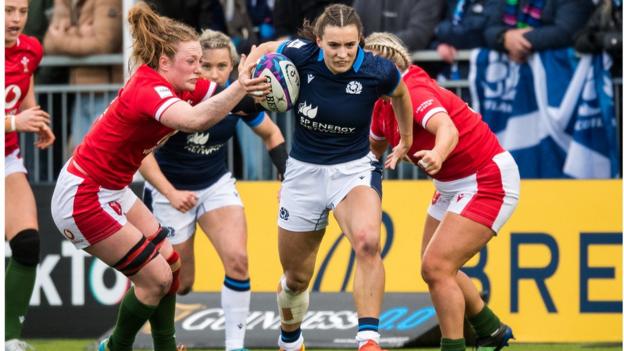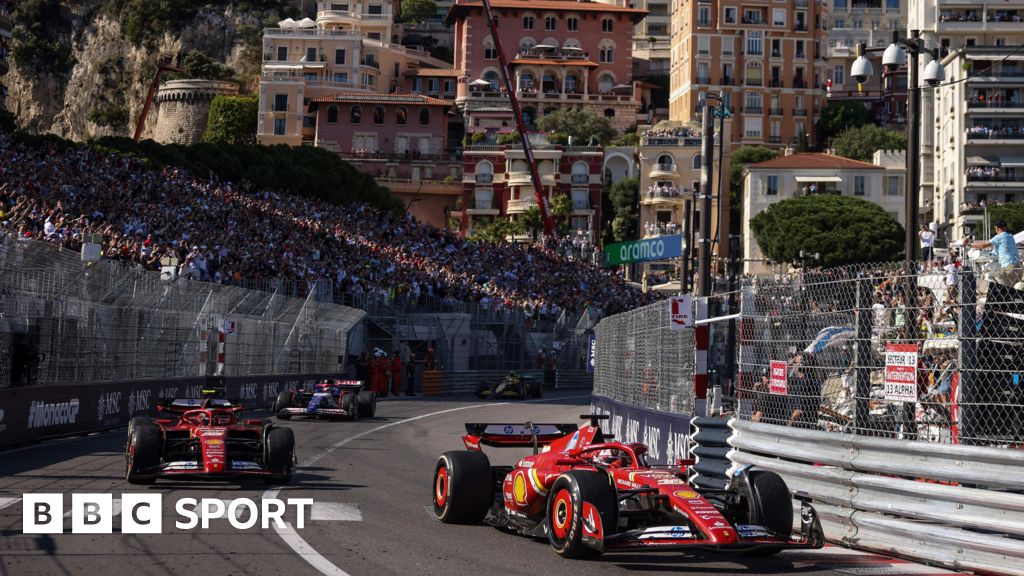| Venue: Cardiff Arms Park, Cardiff Date: Saturday, 23 March Kick-off: 16:45 GMT |
| Coverage: Watch live on BBC Two Wales, BBC iPlayer and online from 16:30 GMT; listen on BBC Radio Wales & Radio Cymru; text commentary, highlights and report on BBC Sport website and app. |
It wasn’t too long ago that Scotland were reeling from a Welsh revival in Cardiff, managing to cling on and win by a point in a Six Nations thriller.
We might see similar high drama this Saturday, as games between Scotland and Wales in women’s rugby are often excruciatingly tight affairs and this one is expected to be no different.
In addition, the match also represents the chance for Scotland to win a record seventh consecutive game.
Of course, players and staff have told us they’re only focused on one game at a time. That may well be true, but fans are allowed to dream.
If Scotland were to notch an opening victory and repeat last season’s feat of beating Italy and Ireland, they would win three Six Nations games for the first time since 2005 – when Spain competed instead of Italy.
In the 28-year history of the competition, Scotland have only won three or more games on four occasions. It would be an obvious indicator of how far this Scotland team has come in a short space of time.
It was just 2022 when Bryan Easson’s side collected the Wooden Spoon, winless in all five matches – albeit picking up three losing bonus points.
Since then, they’ve gone toe to toe with Australia at a World Cup and won the inaugural WXV 2 competition, putting themselves on the brink of a historic seventh consecutive win.
“We’re not quite benchmarking ourselves against England and France as yet,” Easson admitted. “We would benchmark performances and I would say performances year on year are improving and we are closing the gap. It will take time.
“We’ve only been professional now for 18 months. Wales, Ireland, Italy and ourselves are all pretty much in the same boat.”
Those games against England and France certainly cool the jets. Both put 50 points on Scotland last year to remind them of their place. Three wins might be the goal, but making those other two scorelines competitive would be even better.
Wales edge tale of the tape
Back to the task at hand. Wales’ eight-point victory in Edinburgh last season was the biggest winning margin between these sides since 2016.
Three points split them at the delayed World Cup in 2022 – an 86th-minute Kiera Bevan penalty giving Wales the win in Whangarei, New Zealand.
In the 2022 Six Nations, Wales won by five. Scotland’s last win, in 2021, was a seven-point margin. In 2019, it was just two points. In 2018 and 2017, it was just one.
These games are played on a knife’s edge and the smallest of margins could swing it. Despite her side’s incredible form going into the tournament, Scotland captain Rachel Malcolm is keen to paint the Welsh as favourites.
“We’re under absolutely no illusion that they’ll be gunning for us and that we are probably the underdogs,” the skipper said.
“But this Six Nations for us is about building on that brand of rugby we’ve started to show and also get results off the back of it. Performance has got to be the forefront of that, but we’re super excited.”

Scotland’s stars and rising talent
One reason for the rapid turnaround in fortunes for Scotland has been the emergence of a new wave of talent.
The likes of Lana Skeldon, Emma Wassell, Rachel McLachlan and Chloe Rollie have shone even in the darkest of times, but their strength has been reinforced by emerging players – many who have been given a shot at high-level rugby thanks to the Celtic Challenge Cup.
Francesca McGhie was last year’s breakout star – not just for Scotland but for the sport. Then there’s 20-year-old Emma Orr, who has taken to international rugby like a duck to water.
Back-rower Evie Gallagher and utility back Meryl Smith have added power and flair respectively, while Elliann Clarke and Elis Martin now have PWR experience in the front row.
Easson always had a fairly strong XV, but when games got tough, Scotland had a tendency to fall away as players tired and replacements couldn’t quite match the level required.
That is no longer the case. He’s got the headache all coaches want – selection dilemmas across the field, players fighting for jerseys and desperate to play for their country.
“External people would talk us down and probably tell us we weren’t very good,” Malcolm said. “We knew that we were building something really exciting and we knew what we were capable of.
“We really had to drive that because we were on the back of a record number of losses at one point and you do start to doubt yourself.
“Now, having been to a tournament and dominated that tournament, we’ve proven to ourselves that we’re not crazy.”





















